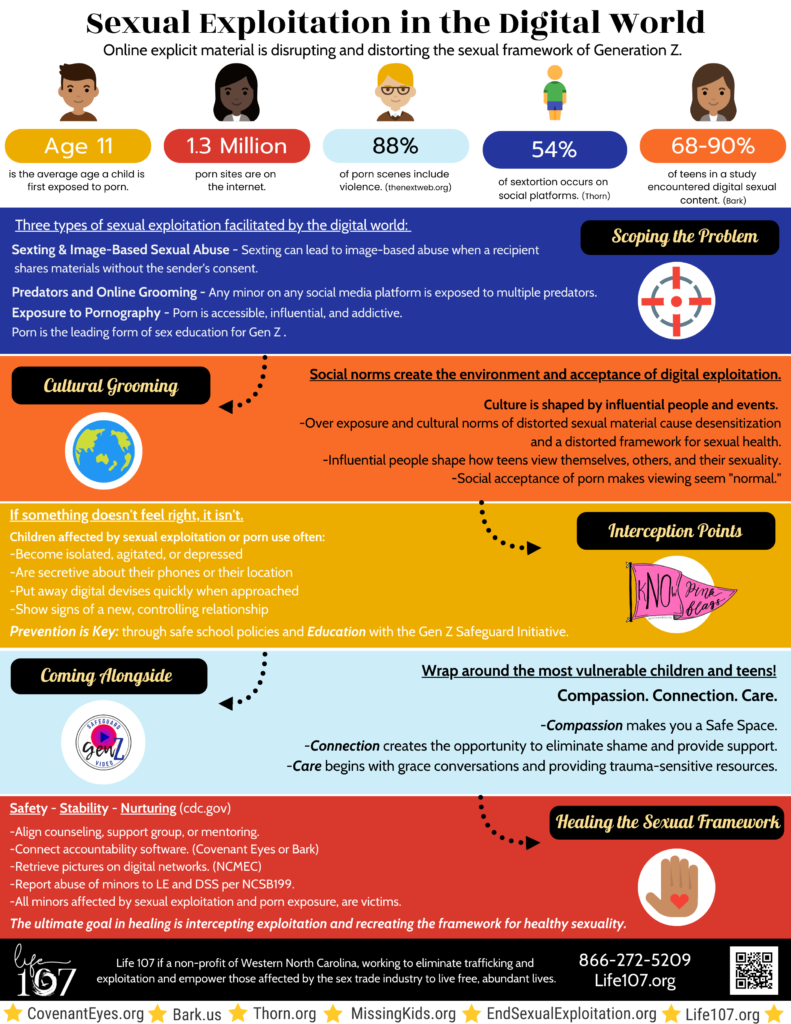The digital world has taken sexual exploitation to a whole new level in three distinct ways:

Sexting and Image Based Sexual Abuse: Sexting leads to image-based abuse where images are shared with others without the sender’s consent. Once these images hit online platforms, they are difficult to recover.
The exposure of vulnerable minors to online predators: Most grooming now occurs on online platforms. Any child on any social media platform is exposed to predators who have access to them on their devices.
The exposure of minors to pornography: Porn is the most detrimental to the sexual framework of children and teens. It is ACCESSIBLE, IMPRESSIONABLE, & ADDICTIVE.
— Accessible: Porn is accessible, literally with the click of a button. With more than 1.3 million porn sites on the internet, kids are being exposed to degrading sex acts on screen. Porn is now the most common form of sex education to adolescents.
— Impressionable Is not an accurate depiction of intimacy with 88% of scenes showing violence. Kids are learning an unnatural and violent way to sexually engage with other humans — which has nothing to do with intimacy.
— Addictive: Porn is the new drug of generation Z. It is extremely addictive, hijacking the frontal lobe of the brain and acting like a drug.
FIND MORE INFO through our Just a Click Away Campaign HERE
The digital world has caused a major shift in the framework of sexuality and has aligned vulnerable minors with image based abuse, predators, and porn. But there is hope to intercept the exploitation of minors. Start early. Have conversations with children. And monitor their devices.

Talking to your children about sex, pornography, and exploitation will be the hardest conversation you’ll ever be glad you had. Be bold. Start the conversation. Safeguarding kids and teens means having candid, age-appropriate conversations with boys and girls about online predators, the dangers of pornography, and the detriments of sharing personal images with others.
For young girls, self concept and the accurate perception of their own value is the guiding compass for every choice they will make, even decisions involving sexuality. Start early by giving your young children a strong sense of self worth. For boys, their character and exposure to accurate perceptions of women, is a guiding compass for their decisions in sexual intimacy. Build strong boys with the capacity to value themselves and value others.
FACT #1) Many victims of the sex trade industry enter the life before the age of 15. ( World Without Exploitation)
FACT #2) Online predators groom boys and girls online – Grooming is the process of manipulating and coercing a minor into activity online that can become sexually exploitative. “Online grooming is a term used broadly to describe the tactics abusers deploy through the internet to sexually exploit children.” (Thorn.org)
FACT #3) 1 in 7 runaway children are “likely” sex trafficked. (Polaris Project)
FACT #4) Talking to children about these sensitive issues doesn’t instigate their interest or risk for being a victim of sex trafficking or being a trafficker. Not talking about these issues, will.
FACT#5) Pornography is now the leading form of sex education to adolescents and depicts degrading and violent sexual images.
You can encourage online safety for the minors in your home:
- Encourage children and teens to only view material online that they would feel comfortable viewing, with you (their guardian) beside them.
- Teach them to avoid interacting with any new “friends” online. A friend is not an online profile picture of someone they don’t know well. Predators often manipulate children and teens with lies, flattery, and false personas.
- Remind them not send pictures of themselves to others – even to friends. These pictures can be used against them in threats and entrapment. If they already have, be open enough for them to come to you about how to move beyond their mistake. It’s important they know they will not be judged or punished for coming forward.
- Reinforce that they should never meet anyone they are connected with online, for any reason.
- Teach them to avoid conversations on social media, texting, video apps, or online gaming systems with anyone they don’t personally know. “Personal” means a person they have had multiple face-face interactions with and has proven to be trustworthy.
- Guide them to trust their gut. When something doesn’t feel right, it isn’t. Be courageous and leave or exit any interaction or material that instigates a gut reaction.
- Uplift them and constantly remind them of their immense value, worth, and promising futures and that you are always there for them.
Thank you for the commitment you show daily to your kids/teens and for your presence in their lives. The Life 107 team supports you as amazing parents – If we can be of assistance, please email director@life107.org.
Resources for talking with your kiddos about pornography, sexting, sextortion, and trafficking:
National Center for Missing and Exploited Children: kidsmartz.org/TeachingTools
National Trafficking Resource Center: NHTRC Student Engagement Toolkit
Online Training: Human Trafficking Awareness for Educators
US Department of Education: TIP Fact Sheet for Schools
